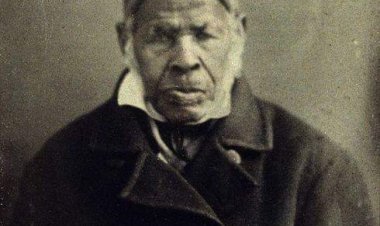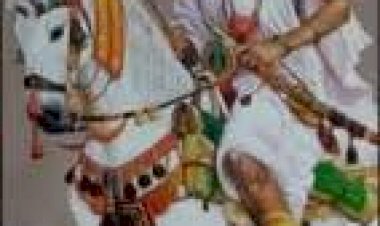ON THE IMPORTANCE OF FULFULDE` IN THE REFORM MOVEMENT OF SHEHU UTHMAN DAN FODIO

By Shaykh Muhammad Shareef bin Farid
Perhaps no cultural ingredient that binds a people together cohesively is more important than linguistic unity. Through language a people can assert its values using its own internal reference. Through language unanimity, people define themselves, their universe and project themselves into the future.
More importantly language allows a people to defend themselves against cultural aggression of all sorts. The measure of their enemy is defined using their own frame of reference and the diameter of their struggle defensively precludes any encompassing by the dogma their enemies.
The linguistic cohesiveness of the Turudbe’ Fulani demonstrates their desire for cultural unity and continuity. Shehu Uthman Dan Fodio indicated this in his Wasiyya (Final Testament), which was the last writing that he bequeathed, to his nation. He reiterated the importance of the linguistic unity of the Turudbe’ Fulani and how this helps in the stability of their struggle. He said:
“Those who are from among us, should never neglect the Fulfulde` language, because it is our language and the language of our fathers and grandfathers. Whoever abandons the Fulfulde` language, then he is not from among us. Therefore, I implore you by Allah, do not forsake speaking with the language of Fulfulde` and do not discard it. And the least you should know from it is the greetings of morning and evening and what is required in taking care of the needs of the house.”1
Clearly Shehu Uthman made the knowledge of the Fulfulde` language an integral element of the cultural personality of his people as well as those who followed them. Linguistic unity among the Turudbe’ Fulani was “the unique common denominator, the characteristic of cultural identity par excellence’.2
The unanimity engendered by linguistic unity can never be disregarded because it lays down the diameter of cultural expression, which in turn establishes the circumference and extent of civilization. Thus, the Turudbe’ were able to establish a linguistic referent that allowed them to define themselves, their environment and delineate their enemies from their own perspective.
Diop emphasizes this cogent point, quoting Montesquieu, when he said: “as long as a conquered people have not lost its language, it can have hope.” This principle proved extremely important for the descendants of the Turudbe’, who were able to maintain some semblance of their language among the Gullah-Geeche nations of Louisiana, Mississippi, South Carolina and the Sea Islands of Georgia.3
The Shehu insisted that even the use of daily greetings was sufficient to include his followers in the ‘linguistic umbrella’ of his Jama`at. It was not necessary for his disciples to know the entire lexicon of Fulfulde’ to be included in the embrace of the spiritual covenant that was given him. This is significant because one modern linguist said precisely that when language is used as a ‘covert agency’ where mere micro-linguistic features of a language are intentionally used to identify membership, include outsiders and exclude those undesirables.
“The link between language and identity is often so strong that a single feature of language use suffices to identify someone’s membership in a given group. On the battle field after the victory over the people of Ephraim, the Gileads applied a language identity test to sort out friend and foe: All of the soldiers were asked to pronounce the word shibboleth; those who pronounced the first consonant as [sh] were friends, those who pronounced it [s] were enemies and therefore killed at once (Judges: XII-6). Hence a single phonetic feature may be sufficient to include or exclude somebody from any social group.”4
Thus, the Shehu established a micro-linguistic watershed for determining who were considered ‘real’ members of the Jama`at, along with the spiritual and erudition required for such inclusion. It is no wonder that generations after the demise of the Sokoto Caliphate in northern Nigeria, and the devolving and near disappearance of Fulfulde’ as a common linguistic factor among his descendants; that Waziri Junayd took it upon himself to learn the language of Fulfulde` on his own while in his mid-forties is indicative of the devolution of the language as a lingua-franca in Northern Nigeria; the original home of the Khalifate.
It is also not surprising that the leading Fulfulde` linguist in northern Nigeria is Prof. Ibrahim Makoshi, who originates from the lands of the hijra in Sudan from the Fulani town of Maiurno on the Blue Nile.
In 1966, Waziri Junayd composed his Ta`leem al-Ikhwaan Bi Dhikri Man Ta`allamtu Minhum Lughata ‘l-Fullaan in which he listed more than twelve Turudbe’ masters of the Fulfulde’ language that he studied with. Among them were Mallam Ibrahim ibn Abdullahi Wajaka, Mallam Mugaaje Bujji, the learned Muhammad Bi Murri, al-Alim Limaam, the ascetic female erudite Manmanghi; Mallam Isa Bi Maruuta, Mallam Muhammad Ghududu, Mallam al-Haj Bi Asarakkawa, Mallam Jedo, Mallam Bughanshu Gida, Mallam Mawdu al-Mufti, and Mallam Abd’l-Qaadir Maalanuuraji.5
After mastering the lingua franca of the Jama`at, Waziri Junayd then composed his famous Marti`u al-Adhaan `Ala Lughat ‘l-Fulaan in Arabic in which he systematized the entire gambit of the Fulfulde’ language. After this he composed his famous al-Bakuurat al-Janiya `Ala al-Lughat al-Falatiya in prose in which he elaborated and explained what he had versified in the Marti`u. 6
What is significant in the above is that some seven generations after the Shehu, his disciples continue to learn and systematize the Fulfulde’ language as he advised in his final testament to his nation. In the Wasiyya, Shehu Uthman reminded the Turudbe’ of their connection with the Abrahamic line and of the mission and responsibility that such a connection brings.
The Bible gives an indication of the mission that Abraham was given to keep and preserve the covenant. This covenant was given to the seed and descendants of Abraham throughout the generations. 7
The Creator promised to make of the descendants of Abraham a great nation and bless all the nations by means of him. 8
The Shehu, in his final testament, like the Patriarch Abraham enjoins on his followers, children and supporters of the Turudbe’ to adhere to the Way and the covenant of their father Abraham as it was fulfilled in the last and seal of the Prophets, Muhammad, may Allah bless him and grant him peace. He reminds the Turudbe’ of their mission to guide the world to the Truth, as a solemn pledge to Allah:
“Verily I only hope that I can be included among those spiritual leaders who are the answer to the supplication of our great grandfather Ibrahim al-Khaleel, upon him be peace, in which He said: ‘And make us to be spiritual leaders for the pious.’ I have derived much benefit from the general meaning of this verse because Allah ta`ala includes in this supplication the descendants of Ibrahim, and we (the Turudbe’ Fulani) are from among them.” 9
Here he persuades the Turudbe’ Fulani that the covenant of Abraham is not just a covenant of blood, but also a covenant of a spiritual commitment to be leaders and guides for the righteous. This identity construct induces a perpetual commitment to fulfill the Divine promise of the Creator and an answer to the supplications of the ancestors. This type of asabiya (group solidarity) is very hard to eradicate once it has been established in the psychic of the people.
What is significant about the reform movement of Shehu Uthman Dan Fodio is that he was able to address his people and transmit the values of social transformation via the language of Arabic, Hausa, Fulfulde` and Tedmekket. When he would give a lecture, he would speak in all four languages based upon the audience he was in front of.
All of his books on divine unity (tawheed), jurisprudence (fiqh), and spiritual purification (tasawwuf) were composed in Arabic. However, when it came to articulating the advanced levels of mystical secrets and philosophical sufism, the Shehu would compose them in Fulfulde` language.
An example of this are two compositions the Shehu composed one a liturgical poem and his most important litany or wazifa. The liturgical poem of making tawassul of Shaykh Abd’l-Qaadir al-Jaylaani, about which Shaykh Abdullahi Dan Fodio said:
“Then, the Shehu, may Allah continue to honor Islam by means of him; when he saw that the community (jamaat) increased in number; and they desired to separate themselves from the disbelievers and establish the jihad; he encouraged them to take up weapons by his words: ‘The preparations with weapons is a Sunna.’ As a result we all began to train and prepare ourselves. The Shehu then began to supplicate Allah asking Him to establish the sovereignty of Islam in these lands of the Blacks. To this end he composed his Qaadiriyya poetic song in Fulfulde`; which I myself, Arabized its verses.” 10
The second liturgical work which comprise the secrets of the Shehu’s mystical philosophy and cosmological world view is his Munaajat, which was originally composed in Fulfulde`, and was Arabized by his son, Sultan Muhammad Bello.
Thus, the Shehu utilized the Fulfulde language to record those special and initiatory sciences that were classified and kept secret except from the spiritually elite among his disciples. He not only used the Fulfulde language as a marker to define his community, but he also used his language as an encryptive device to hermitically conceal certain sciences from the un-initiated.
Through the strategic use of the Fulfulde` language, the Shehu reminds the Turudbe’ that the asabiya (group solidarity) and social identity that binds them is not based upon blood, but it is built on a commitment to the spiritual and moral guidance of the world. The Quran speaks to that when Allah tells Abraham: “I am making you a leader of the whole of mankind.” Then Abraham replied: “And will You do the same for my descendants?” Allah ta`ala replied: “My covenant will not embrace the unjust oppressors.” 11
Shehu Uthman Dan Fodio, also emphasized this Abrahamic covenant which excluded the unjust and oppressors. The Shehu said:
“This is our inheritance and the inheritance of our grandfathers. We are upon that mission without being kings and rulers who practice oppression and injustice. And those who follow me in that then they are from me, and if not, then not! So that all those who love me from the brothers, the descendants and loved ones, rather all those who follow my commands and are content with my teachings and have answered my call – may know that I am not a wretched oppressor devoid of compassion, as some have said.
It is necessary and obligatory for every reasonable believer to follow the traces of their believing ancestors, to follow the Way of their righteous grandfathers and imitate them. For this reason, I have chosen to imitate my grandfathers in adhering to the Sunna strongly so that I can be a guide to what is good like they were. For the one who guides to what is good is like the one who does that good and will attain the reward of those who act on that good.” 12
The identity construct of the Turudbe’ Fulani being as it is connected to the Abrahamic line includes the blessings of the covenant, but also comprises the promise of affliction. This is a reflection again on the concept of the ‘tried stone’ and the concept of ‘sacrifice’ that is so essential in the identity construct of the Abrahamic tradition.
The idea of rejection and being made a ‘stumbling block’ for the nations comprise the core belief system of the Bani Isra’il and it is reflected in the supreme sacrifice that Abraham was called upon by Allah to perform. This self-sacrifice becomes the means by which nations will be judged and rewarded. The same stone that was a stumbling block for many and was rejected by oppressive nations would become the ‘corner stone’ of a New World. This identity construct becomes the most powerful element of defense in the face of social and cultural aggression.
FOOTNOTES:
1. Uthman Dan Fodio, Wasiyya’s-Shaykh Uthman ibn Fodio, (Gaskiya Corporation, Zaria, 1989), pp. 23-24.
2. Cheikh Anta Diop, Civilization or Barbarism, p. 214.
3. Ibid.
4. Thomas, B. Klein, “Linguistic Identity, Agency, and Consciousness in Creole: Gullah-Geechee and Middle Caicos”, Linguistic Identity in Postcolonial Multilingual Spaces, (Newcaste, Cambridge Scholars Publishing, in press), p. 9.
5. Junayd ibn Muhammad al-Bukhari, Ta`leem al-Ikhwaan Bi Dhikri Man Ta`allamtu Minhum Lughata ‘l-Fullaan, xerox copy of manuscript in possession of author, ff. 1-6.
6. Ibid, f. 10.
7. Bible – Genesis: 17:9.
8. Ibid. 12: 2-3.
9. Uthman Dan Fodio, Wasiyya, TMs, ff. 4-6.
10. Abdullahi Dan Fodio, Tazyeen al-Waraqaat, original manuscript in possession of author, folio 35.
11. Qur’an: 2: 123.
12. Uthman Dan Fodio, Wasiyya, TMs, ff. 4-6.
SOURCE:
The Lost & Found Children of Abraham in Africa & the American Diaspora:


















































